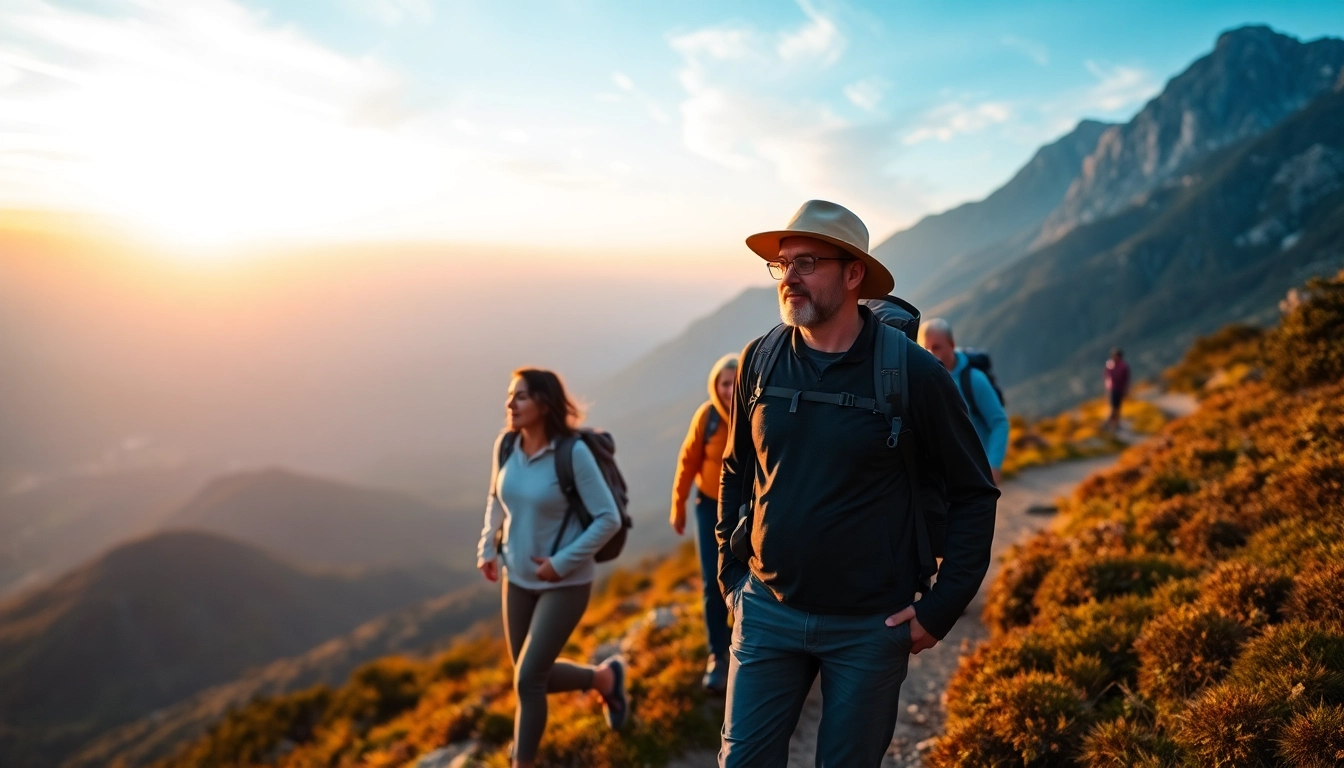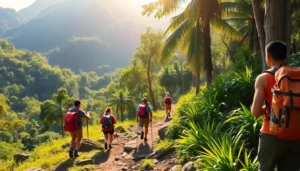Understanding the Essentials of a Guided Trek
What Defines a Guided Trek and Its Benefits
A guided trek is more than just a long walk through natural landscapes; it is an organized journey led by experienced guides who ensure safety, provide local knowledge, and enrich your adventure experience. Whether traversing remote mountains, lush forests, or cultural landmarks, guided treks facilitate deeper understanding of the terrain and local traditions, making them ideal for both beginner explorers and seasoned trekkers seeking a curated experience.
One of the principal benefits of a guided trek is safety. Navigating unfamiliar terrains, especially in challenging environments such as Indonesia’s rugged islands or remote mountain ranges, can pose risks. Guided treks mitigate these risks with trained professionals who are familiar with the routes, emergency protocols, and first aid procedures. Additionally, guides serve as cultural interpreters, sharing insights about local customs, wildlife, and history, thus transforming a physical journey into an educational adventure.
For instance, exploring Indonesia’s diverse landscapes — from volcanic peaks to tropical rainforests — becomes more meaningful with a knowledgeable guide. If you are curious about planning an guided trek in Indonesia, understanding the core benefits can help you maximize your experience and ensure you receive tailored support.
Overall, guided treks combine safety, education, and personalization—making them a compelling choice for travelers who desire an immersive and well-supported adventure.
Core Components of a Guided Trek Experience
An enriching guided trek encompasses several core components that collectively define its quality and appeal:
- Experienced Guides: The backbone of any guided trek, guides possess extensive knowledge of the route, terrain, weather patterns, and local culture. They are trained in safety protocols and often bilingual, facilitating communication with local communities.
- Customized Itinerary: Guided treks offer tailored routes based on participants’ fitness levels, interests, and time constraints. This flexibility ensures a personalized experience, whether you seek a leisurely walk or a challenging ascent.
- Quality Equipment and Logistics: Proper gear management, transportation arrangements, permits, and accommodations are handled seamlessly by the guiding company, removing logistical headaches for trekkers.
- Educational Insights: Guides share stories, ecological facts, and cultural context, transforming a simple hike into an educational journey that deepens appreciation for the destination.
- Safety Protocols: Pre-trip briefing, emergency response plans, and access to medical support are integral to ensuring participant well-being at all times.
In Indonesia, for example, these components are crucial given the country’s diverse landscapes and sometimes challenging terrains. A well-organized guided trek will incorporate local expertise about volcanic areas, rainforest ecology, and indigenous cultures, providing a richer experience.
Why Choose Guided Tours for Trekking Adventures
Opting for a guided tour over independent trekking offers numerous strategic advantages:
- Safety and Security: Professional guides are trained to handle emergencies, navigate complex terrains, and ensure that participants are prepared for unpredictable situations.
- Cultural and Local Insights: Guides act as cultural ambassadors, offering in-depth knowledge about local traditions, history, and biodiversity, often unavailable to solo travelers.
- Logistical Convenience: Guided tours handle permits, accommodations, transport, and meals, allowing trekkers to focus solely on the experience without logistical stress.
- Community Engagement: Many guided treks in Indonesia include visits to local villages, providing travelers the opportunity to support and learn from indigenous communities.
- Enhanced Learning and Enrichment: Educational components, storytelling, and interactive activities delivered by guides create a more engaging and memorable experience.
For example, choosing a guided trek in Bali or Lombok can turn a scenic hike into a cultural immersion—learning about traditional weaving, local culinary practices, or ecological conservation efforts directly from local guides.
Planning Your Perfect Guided Trek in Indonesia
Selecting Suitable Trekking Routes and Difficulty Levels
Indonesia offers a plethora of trekking options suitable for all fitness and experience levels. Whether you’re looking for an easy nature walk or an arduous mountain ascent, careful route selection is essential. Popular trails include the challenging summit of Mount Rinjani in Lombok, which offers spectacular vistas and volcanic landscapes, and the moderate treks through Bali’s rice terraces and forests.
To choose the right route, assess your physical fitness and trekking experience. Most guided operators provide detailed descriptions of trail difficulty, distance, and elevation gain. Beginners might start with shorter, lower-altitude walks, such as Bali’s Munduk Village trek, while experienced hikers may prefer the multi-day Rinjani trek or the remote Papua Highlands.
Consulting with a trusted local guide or tour provider helps identify the best routes tailored to your capabilities. Advanced planning ensures you enjoy the trek fully without unnecessary fatigue or risks.
Best Seasons and Times to Embark on a Guided Trek
Indonesia’s tropical climate influences trekking seasons. The dry season, typically from May to September, offers the most stable weather conditions and optimal trekking conditions. During this period, trekking routes are less muddy, and visibility is excellent, making your experience safer and more enjoyable.
Conversely, the rainy season from November to March can lead to muddy trails, landslides, and safety hazards, which can compromise the experience and safety of trekkers. However, some trekkers prefer the lush landscapes and fewer crowds during this period, provided they are prepared for weather variations.
Planning your trek during the right season is critical, especially for high-altitude or volcanic routes. Consult with local providers, as they have up-to-date weather information and can advise on the best timing for specific trails.
Gear and Preparation Tips for a Safe Trekking Trip
Proper preparation and gear are paramount for a successful guided trek. Essential items include sturdy hiking boots, moisture-wicking clothing, sun protection, a wide-brim hat, and a hydration system. In volcanic or mountain environments, layered clothing is advisable to adapt to temperature fluctuations.
Other critical preparations involve physical conditioning—engaging in cardio and strength training weeks before your trek enhances endurance. Familiarize yourself with basic first aid, and carry a small kit with bandages, antiseptic, and altitude sickness medication if applicable.
Engage with your tour operator beforehand to receive a detailed gear checklist tailored to your specific route. Also, packing lightweight, high-energy snacks can boost stamina, and a biodegradable waste bag supports eco-friendly trekking practices.
Finding Top-Rated Guided Trek Providers in Indonesia
Features to Look for in a Reliable Guide Service
Selecting the right guide service is crucial for ensuring safety, enjoyment, and value. Key features include certified guides with local knowledge, positive customer reviews, comprehensive insurance, and adherence to environmental standards. Transparent pricing, flexible itineraries, and responsive customer support are indicators of professionalism.
In Indonesia, reputable companies often partner with local communities, promote sustainable tourism, and incorporate eco-friendly practices. By prioritizing these features, you can enhance your overall trekking experience and contribute to local development.
Questions to Ask Before Booking Your Guided Trek
To ensure compatibility and clarity, ask prospective providers about their guides’ qualifications, safety protocols, group sizes, equipment provided, and contingency plans in case of emergencies. Clarify inclusions such as permits, meals, and accommodations, and inquire about the cancellation or rescheduling policies.
For example, a professional guide company in Indonesia should offer detailed information about the trek’s difficulty, environmental considerations, and cultural interactions—helping you make an informed decision.
Customer Reviews and Success Stories
Reading reviews and success stories offers insights into the reliability and quality of a guide service. Look for feedback on guides’ professionalism, the scenic beauty experienced, safety management, and the overall enjoyment. Testimonials often highlight unexpected discoveries, cultural exchanges, and personal growth during the trek.
Engaging with past trekkers via social media or travel forums can provide authentic perspectives, guiding you toward providers with proven track records.
Enhancing Your Trekking Experience with Local Knowledge
Wildlife, Culture, and Natural Landmarks
Indonesia’s rich biodiversity and vibrant cultures make guided treks uniquely rewarding. Guides can reveal hidden gems such as endemic bird species, orchids, and jungle fauna, along with significant landmarks like active volcanoes, sacred waterfalls, and ancient temples nestled within the landscapes.
For example, during a Rinjani trek, guides share stories about the volcano’s geological history, local myths, and conservation efforts—providing context that elevates the hiking experience beyond mere scenery.
Engaging with Local Communities Responsibly
A responsible guided trek promotes sustainable tourism by supporting local economies and respecting indigenous cultures. Guides often facilitate visits to traditional villages, allowing trekkers to experience authentic ways of life, participate in cultural activities, and purchase handcrafted souvenirs. Ensuring that interactions are respectful and beneficial for local communities is a shared responsibility.
Incorporating Cultural and Educational Elements
Incorporating educational components, such as learning about traditional cooking, dance, or eco-conservation practices, enriches your journey. Guides can arrange cultural performances or visits to local markets, fostering a deeper understanding of Indonesia’s diverse heritage. These elements transform a physical trek into an immersive educational experience that creates lasting memories.
Maximizing Safety, Comfort, and Enjoyment on Your Guided Trek
Emergency Protocols and Support During the Trek
Safety protocols include pre-trek health screenings, clear communication of emergency procedures, and access to first aid kits. Guides are trained to handle altitude sickness, injuries, and weather emergencies. It’s vital to follow their instructions and carry personal identification and health insurance documentation.
Choosing a provider with established support systems, such as satellite communication or rapid evacuation plans, ensures you are protected in unforeseen situations.
Health and Fitness Considerations
Adequate physical preparation enhances your ability to enjoy the trek. Cardiovascular fitness, leg strength, and endurance are key factors. Regular walking, hiking on varied terrain, and strength training weeks before departure are recommended. Additionally, consult healthcare providers about vaccinations, altitude medicine, or necessary prescriptions.
Post-Trek Tips for Recovery and Reflection
After completing your guided trek, prioritize rest and hydration. Consume nutritious meals and keep a travel journal or photo collection to reflect on your experience. Sharing stories with fellow travelers and providing feedback to your guide service can help improve future treks and foster a sense of achievement.

